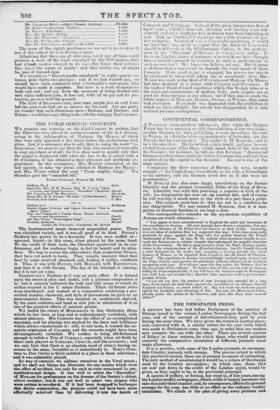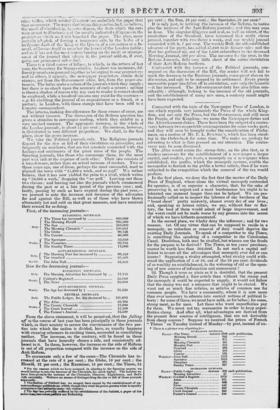THE NEWSPAPER PRESS.
A RETURN has been laid before Parliament of the number of Stamps issued to the various London Newspapers during the last year, and of the amount of Advertisement-duty paid by each during the same time. We have given the return in another place; and, connected with it, a similar return for the year 1830, which was made to Parliament some time ago, in order that our readers may compare the one with the other. There are several sources of fallacy in these returns, for which those who would estimate correctly the comparative circulation of different journals must make allowance.
It is a practice, with some of the London journals, to accommo- date Country journals with stamps. The precise extent to which this practice is carried, there are at present no means of estimating. The only method of ascertaining it would be, a return of the stamps used by the Country newspapers; in which case, those that are now put down to the credit of the London agent, would be given, as they ought to be, to the provincial principal. A species of puffery, or forcing, has crept in, of late years,among the London weekly newspapers, which, while it largely increases the sale ofan individual number, and, by consequence, afliactathe general average for the year, has little or no effect on the ordinary weekly eirculatien.. We allude to the plan of giving away pictures an& tither trifles, Whicik neitho: illastratf 'nor embellish tire paper that they accompany„ The paper that lqc•:;.an this practice, had, we believe, the merit of Y ill s::as..n degree, the facts whieh the cuts were meant to illustrate, a:4 I he novelty indicated a diligence in the propr.:.•:rs which no ckfot benefited the paper. The plan, more re;.:::_ly adf;pted, of forcing a temporary sale, by the bribe of a halft,..!:Iny daub of the King or the Queen, of a coronation or a fu- neral, addresses itself to none bat the lowest of the London public; and as it has not the most remote bearing on the merit or manage- ment of the journal that adopts it, the journal seldom, if ever, gains one permanent subscriber. There is a third source of fallacy, to which, in the return of last year, the Secretary for Stamps alludes. In about ten instances, dif- ferentjournal s are grouped together as belonging to one prop rietory; and in others, it appears, the newspaper proprietors obtain their stamps, not from the Government otlice, but, from the paper-sta- tioners. The latter make a return of the journals which they supply; but there is no check upon the accuracy of such a return ; neither is there a shadow of reason why any care to render it correct should be employed, while a hundred reasons may exist for the contrary— e. g. for crediting the journal of an acquaintance or a friend, or a partner, in London, with those stamps that have been sold to a Country correspondent.
The returns, making due allowance for these causes of error, are not without interest. The discussion of the Reform question has given a stimulus to newspaper reading, which they exhibit in a very marked manner. The aggregate increase, in the whole of the London journals, is about 12 per cent.; the increase, however, is distributed in very different proportions. We shall, in the first place, show the gross increase.
We take the Political journals only. The Religious journals depend for the rise or fall of their circulation on principles, and frequently on accidents, that are but remotely connected with the feelings and sentiments of the great mass of the people. The Sporting journals, like those who encourage them, for the most part was rich at the expense of each other. Their rise consists of a transference, rather than an actual increase of readers. Two or three years ago, one of these, perhaps the most successful, used to placard the town with "25,000 a week, and no pug:" We rather believe, that it has now yielded the palm to a rival, which writes up "30,000 a week," dropping the " no puff." Leaving out these two classes ; and leaving out also the journals which commenced during the past or at a late period of the previous year ; and, lastly, passing by such as have expired during the past year,— we proceed to note the increase and decrease of the advocates for and against the Bill, as well as of those who have blown alternately hot and cold on that great measure, and have received their reward for so doing.
First, of the increasing journals—
REFORMING JOURNALS.
The Times has increased by 828,039 The Morning Herald 295,500 The Sun 210,000 Daily. , The Morning Chronicle 4 138,051 The Globe 90,125 L The Courier 60,500 The Spectator 5,950
Sunday Times 80,78 ,950
W‘e
17,000 {
k1F. The Examiner 8
ANTI-REFORMING JOURNALS.
milly.{ The Standard 91,600
The Morning Post has increased by 99,450 Tn weeklY. The John Bull 57,855 Now for the decreasing journals- REFORMINC JOURNALS.
wr. The Morning Advertiser has decreased by
. Cobbett's Registerf w`ek, '•). The News ANTI-REFORMING JOURNAL.
Weekly. The Age has decreased by 1
NEUTRAL JOURNALS.
Dail}, The Public Ledger, .Arc. has decreased by... 121,682
Chronicle 42,700
, The ee AtlasC ount y
{ 13,000
Weck'y' TThhee Farmer's Journalal 12,500
12,500
From the above statement, it will be perceived, that the falling
of in the course of last year has been principally in those journals which, in their anxiety to secure the countenance of the two par- ties into which the nation is divided, have, as usually happens with cunning schemers in exciting times, succeeded in conciliating neither, The increase, on the contrary, will be found in those journals that have honestly chosen a side, and consistently ad- hered to it. In these, however, the increase on the side of Reform is out of all proportion compared with the increase on the side of Anti-Reform.
To enumerate only a few of the cases—The Chronicle has in- creased at the rate of 6 per cent.; the Globe, 10 per cent.; the Herald, 12 per cent.; the Examiner, 16 per cent.; the Times, 24 • For the reasons which we have assigned, in alluding to the Sporting papers, we would incline tomate the increase of the Chronicle, Sze. much higher. The number we have heretiveniis the increase of the Chronicle.. Observer, Englishman, and Bell's Lilt conjointly. 'Well: ave no means of distinguishing the rise or fall of these journals separatdly. t Thediechne-Ofredbbett has, we suspect. been caused by the establishment of nu- merous diretper pnblioarsons, which, though they want his power, possess what is equally at tractiveto the inidisciiminate—his violence.
t The lit.'s& has: prnbahisy suffenxt by the establishment of the Satirist, a paper of the same clam,kbatwhosts_poltuics are Reforming.
• • •
17,735 55,660 23,000 31,525
per cent. • the Sun, 28. per cent.; the Spectator, 56 per cent.*
It is only just, in noticing the increase of the Reform, to netieo also the increase of the Anti-Reform journals ; and this may soon be done. The singular diligence and zeal, as well as talent, of the conductors of the Standard, have increased that really clever journal, together with two thrice a week, and one weekly journal connected with it, 7 per cent. The weekly Bull, the old-established advocate of the party, has added 57,000 to its forMer sale; and the Post has gathered up, out of the 1,000 subscribers to the deceased Morning .1 ournal, 300 per diem. The increase for the year, in the Reform Journals, falls very little short of the entire circulation of their Anti-Reform brethren.
Contrasted with the increase of the Political journals, con- sequent on the discussion of the Bill, the reader will not fail to mark the decrease in the Business journals, consequent also on its discussion, and only to be stopped by its settlement. Every purely mercantile paper has fallen off in circulation, save only the Gazette —it has increased. The Advertisement-duty has also fallen con- siderably ; although, looking to the increase of the old journals, and the establishment of many new ones, a contrary result might have been expected.




























 Previous page
Previous page